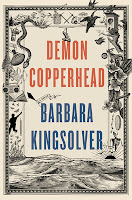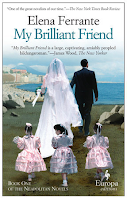Welcome to the 2024 Top 10 roundup!
I read 53 books this year (a middling amount compared to 48 last year and 56 the year before). Of course, this only counts published books. I read nearly a dozen unpublished manuscripts as well, including my own. (More to come on that next year, perhaps....)
When I wasn't reading for pleasure, I was reading for work. In the fiction arena, I edited a second-chance romance between a female CEO and a male yoga instructor, a workplace romance in toy manufacturing, and a murder mystery involving a nonprofit. I also edited several nonfiction books on topics that included career development, an alternative to traditional grading, and attributes of rebel uprisings. (Variety is the spice of life — and of work!)
I never publicly assess books I worked on, so from my 53 pleasure-reading selections, here are the 10 I enjoyed most.
Chain-Gang All-Stars This is: arguably my favorite book of 2024. It's a multi-perspective, semi-futuristic, satirical examination America's prison system-turned-gladiator-style-entertainment. I liked it because: it's smart and insightful, it's funny in a sort of sickening/ironic way, and it moves quickly. I'm also predisposed to like books that are told from multiple characters' viewpoints, and Adeji-Brenyah does this with the mastery of an expert short story writer. (In fact, I also wanted to include his book of short stories, Friday Black, on this list, but there were so many other 4-star books worth platforming, I decided to stick to a one-book-per-author-per-year rule. For now.) Read this if you: like to say "I read the book" when your friend tells you about a TV series. (Mark my words, this will become one.) Also, if you enjoyed The Hunger Games and are ready for a more adult version with harsher violence and deeper themes, this is the book for you. | |
|---|---|
 | Just Mercy This is: the author's real-life account of taking on cases of poor, incarcerated, wrongly accused convicts in Alabama. (He's a lawyer.) I liked it because: it was eye-opening. I consider myself fairly well educated on the American prison system, and yet this book blew me away (in the worst possible way). Stevenson does an admirable job of weaving educational facts and figures around the arresting and also horrifying narratives of the American citizens whose cases he takes on. Read this if you: want to feel simultaneously horrified at the state of injustice in this country and hopeful that the Stevensons of America can help us save ourselves. |
 | Birnam Wood This is: an eco-thriller that starts slowly and snowballs straight through the last page. I liked it because: I've never read a novel paced like this. I also admire Catton's ability to create genuine plot twists that did not come out of left field but were instead based on nuanced characters making decisions according to their own personalities and beliefs. Read this if you: are willing to be patient at the outset, knowing a payoff is coming. Also if you want your fiction to touch on (but not preach about) themes such as collectivism, capitalism, and climate change. |
 | Maybe You Should Talk to Someone This is: a memoir written by a therapist about being a therapist and also going through therapy herself. I liked it because: I am fascinated by therapists and therapy as a profession, and this book offered an inside look at both Gottlieb's patients and her own progression through therapy. Read this if you: enjoy self-aware memoirs full of quirky characters, wry humor, and a lot of reflection (both self-directed and otherwise). |
 | Monsters: A Fan's Dilemma This is: a nonfiction book that looks at artists who have done terrible things and asks (per the book's cover copy): How do we balance our undeniable sense of moral outrage with our equally undeniable love of the work? I liked it because: I ask this question of myself every time I listen to a Michael Jackson song. Dederer does a wonderful job of exploring the question thoughtfully and with context, without offering any pat answers. Read this if you: want to read a smart, cerebral take on the question of what to do with our love of art made by (extremely) flawed humans. |
 | The Friend This is: a slim novel about grief, and also my second sequential Nunez pick. (What Are You Going Through made last year's list.) I liked it because: I saw myself in the narrator, who was close friends with a man whose flaws she saw vividly. Also, when the man dies, she agrees to take his aging Great Dane out of a sense of obligation to the dog and to the dead owner, despite never having owned (or wanted to own) a dog. This is something I am certain I would do. Read this if you: are interested in the subject of grief and enjoy carefully written literary fiction. |
 | We Need to Talk About Kevin Lionel Shriver This is: an epistle-style novel from the perspective of the mother of a boy who commits a school shooting. I liked it because: it takes a good hard look at motherhood and what it means to be a flawed human who has committed to raising a child. It was an extremely difficult book to read, but in the best way; I was constantly feeling repulsed and then needing to examine why. Read this if you: are intrigued by a book that you can't put down but can barely bring yourself to pick up. You'll feel ambivalence, disgust, and, if you're anything like me, deep empathy. |
 | New Teeth: Stories This is: the only book of short stories to make this year's list! (Probably because I omitted Friday Black and didn't read many other collections.) I liked it because: the stories are funny, zany, and quick, all while having both a greater message/theme and generally satisfying endings. Read this if you: are a fan of George Saunders's wackier short stories. The voice in the writing is strong and consistent, so you'll know quickly whether Rich's writing is for you or not. |
 | Lean Fall Stand Jon McGregor This is: a three-part novel: part thriller, part domestic strife, and part reconciliation. I liked it because: it yanked me in with a thrilling first act in which McGregor writes extremely grippingly about men in Antarctica. I was also stunned by the author's ability to portray aphasia both from close proximity (in Robert's perspective as he experiences a stroke) and from afar (as other characters, such as his wife, Anna, perceive him after the stroke). Read this if you: gravitate toward nature-forward writing from authors like Richard Powers and Charlotte McConaghy, with more of McConaghy's flair for tension. |
 | How Not to Drown in a Glass of Water This is: a novelette-length first-person character sketch of a 56-year old Dominican immigrant who has lost her job. I liked it because: it is one of the most effective exercises in first-person voice I've read in a long time. The narrator, Cara, has a simple and straightforward way of "speaking," but the interwoven stories that comprise her life and the lives of those around her are anything but. Read this if you: want to sit down with an auntie who is stubborn, naive, and too smart for her own good. Or if you enjoy first-person accounts of the immigrant experience in NYC. Or even if you just admire books that are told in the exact number of pages they needed, and not a page more. |
- Very American conflicts (prison/incarceration, school shootings, immigration, capitalism)
- Self-reflection
- No easy answers

























